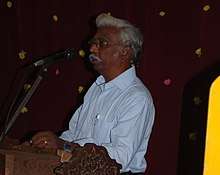C. Livingstone
Chrispus Livingstone (born 2 January 1949), often referred as Livi, is an Indian research scientist, botanist, educator and multifaceted person. He was instrumental in upgrading the department of Botany to one of the top three in India.[1] During his stint the department witnessed significant innovative changes in the curriculum with the introduction of new papers and special projects (optionals) at various levels besides high quality research projects carried out by the senior professors and their research scholars leading to several accomplishments.[2] He was also instrumental in setting up India's first artificial horticulture farm.[3] Among his varied interests is the taxonomy of tropical plants, especially flora of Chennai, then Madras. He is perhaps best known for his book The flowering plants of Madras City and its immediate neighbourhood.
C. Livingstone | |
|---|---|
 | |
| Born | Chrispus Livingstone 2 January 1949 |
| Nationality | Indian |
| Alma mater | Scott Christian College Madras Christian College University of Madras |
| Scientific career | |
| Fields | Plant Taxonomy |
| Institutions | Former chief Of St.Thomas's hall Madras Christian College |
| Website | www.mcc.edu.in |
Family
He was born to Chrispus Manikkam. He has two sons: Amithesh and Brijesh.
Academic achievements
He was Head of Department of Botany at Madras Christian College (2003–2007).[4][5][6][7][8] Livingstone was also course coordinator of Department of Microbiology (self-financed stream), MCC, Curator of MCC campus and president of Scrub Society.[9][10] He was warden of St. Thomas’ hall. He remained Director to MCC farm.[11][12] He is Treasurer of Centre for Plants, People and Ecosystems, a NGO working field based research on knowledge systems related to plants, people and ecosystems.
He showed keen interest in studying the plants of MCC campus from the time he joined the Botany Department and this resulted in the publication of Campus Flora in 1978.[13] Under the district flora project of Botanical Survey of India, he investigated the flora of Chengalpattu District. His genuine interest in the study of flowering plants resulted in the publication of book on Flowering plants of Madras City and its immediate neighbourhood in 1994. He successfully guided 30 M. Phil. Scholars and 11 Ph.D. scholars. He has published number of articles both in national and international repute. He also published several books. Two newly discovered plants of the Andaman and Nicobar Islands, Aidia livingstonii Karthig et al. and Liparis livingstonii Jayanthi et al. are named in honour of Livingstone for his contributions to plant taxonomy. A species of whitefly namely Aleurocanthus livingstonii is also named after him. He is a life member of Indian Association for Angiosperm Taxonomy.[6]
Books
- The flowering plants of Madras City and its immediate neighbourhood / by P.V. Mayuranathan ; revised by C. Livingstone and A.N. Henry.
- Campus flora of Madras Christian College/by Giles-Lal, D. and C. Livingstone. 1978. The Balussery Press. Madras. 78 p.
- Environmental Studies’ (in Tamil), A Resource Book for the Compulsory Course on Environmental Science as per UGC Syllabus / C. Livingstone. 2004. New Age International Publishers, New Delhi.
- Male Female Relationship / C.Livingstone (ed.), 1998. Bharati Mandram, Madras Christian College.
Articles
Some of his significant articles are published in Kew Bulletin, Current Science, Rheedea, Journal of Nature Conservation, Zoos' Print Journal, Journal of Economic and Taxonomic Botany, Check List, etc.
References
- "Our Legacy"
- ""Research Projects"". Archived from the original on 6 November 2013. Retrieved 3 July 2013.
- "Plant ready to be harvested at MCC farm"
- "Our Legacy". Madras Christian College. Retrieved 18 September 2012.
- "List Of Experts On Floral Diversity". Department of Environment, Government of Tamil Nadu. Archived from the original on 18 December 2010. Retrieved 17 March 2011.
- "List Of Life members of Indian Association for Angiosperm Taxonomy". IAAT, Department of Botany, Calicut University, Calicut, Kerala, India. Archived from the original on 21 July 2011. Retrieved 22 March 2011.
- "Retired heads of the Botany Department". Department of Botany, Madras Christian College, Tambaram, Chennai, India. Retrieved 22 March 2011.
- "Retired staffs of the Botany Department". Department of Botany, Madras Christian College, Tambaram, Chennai, India. Retrieved 19 May 2011.
- "Scrub Society, MCC". Madras Christian College, Tambaram, Chennai, India. Archived from the original on 17 February 2011. Retrieved 24 March 2011.
- "Arbours of academia". The Hindu. Retrieved 4 October 2012.
- "The MCC Newsletter, Vol. 1, Issue 8, Page 3" (PDF). Madras Christian College. Archived from the original (PDF) on 22 March 2012. Retrieved 18 September 2012.
- "Plant ready to be harvested at MCC farm". Times of India. Retrieved 4 October 2012.
- Giles-Lal, D. and C. Livingstone (1978). Campus flora of Madras Christian College. The Balussery Press.
- IPNI. Livingst.